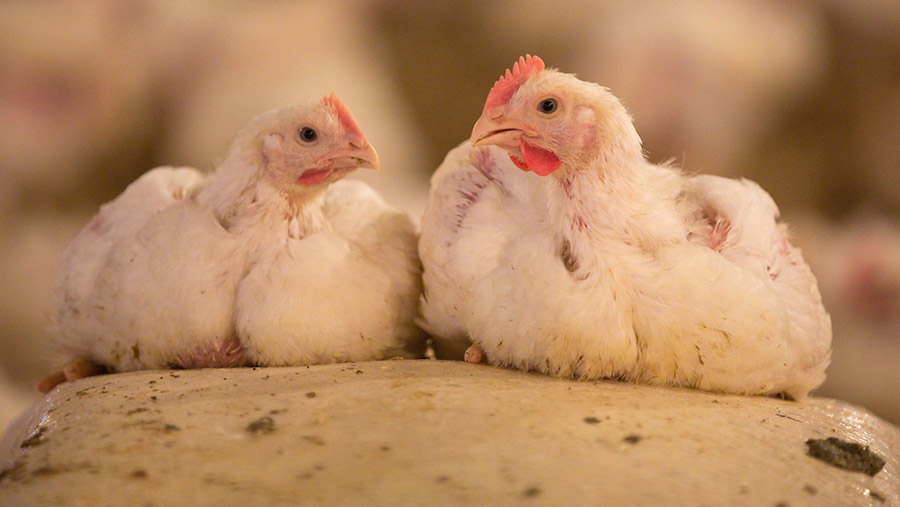Poultry sector denies it relies on a ‘mountain of drugs’
 © Tim Scrivener
© Tim Scrivener Poultry producers have been defending their track record on the use of antibiotics in the face of suggestions by the BBC’s Countryfile programme that the sector is actually using a “hidden mountain of drugs”.
The issue revolves around the use of ionophores in poultry production – an anti-parasitic treatment added to feed to help control the intestinal disease coccidiosis in broilers.
See also: Managing gut health in broilers explained
This condition can lead to intestinal inflammation, reduced absorptive capacity, foot problems and increased mortality.
According to the Alliance to Save Our Antibiotics campaign, which was quoted extensively in Countryfile, ionophores are closely related to antibiotics and their use has been increasing.
A freedom of information request by the Alliance shows that, while the poultry sector has cut the use of antibiotics from 82t to 14t (-82%) over the past five years, its use of ionophores has risen from 212t to 281t (+33%).
Your questions answered
What are ionophores?
Ionophores are animal-only antimicrobials that are not classified as veterinary medicinal products and their usage is not linked to reduction in antibiotics.
They are classed as feed additives by the government’s Veterinary Medicines Directorate.
Why are they used?
Ionophores are used to control coccidiosis, maintain intestinal integrity, avoid pain and suffering and help deliver good bird health and welfare.
If coccidiosis is not controlled, producers may then need to turn to medically important antibiotics as a last resort.
Source: British Poultry Council
The Alliance acknowledges that ionophores are not currently used in human medicine, but says they do have potential to help treat the condition Clostridium difficile in future.
It also points to Norwegian evidence that suggests the use of ionophores in poultry can increase resistance to some antibiotics used in human medicine, though concedes this is not yet proven.
“Because ionophores are toxic, there are also concerns about residues in food and the environmental impact of spreading chicken manure on land,” said a statement.
‘Lack of clarity’
But the British Poultry Council (BPC) says media coverage of these claims has shown a “lack of clarity” and insists ionophores are a critical part of good bird management.
“Ensuring good bird health and welfare is part of a farmer’s responsibility to alleviate pain and suffering and to preserve the health and welfare of birds under their care,” said BPC chief executive Richard Griffiths.
“The way pet owners proactively treat their dogs and cats with wormers to control worms, poultrymeat farmers use ionophores to control coccidiosis in their birds to alleviate pain and suffering.”
The BPC points out that ionophores are “animal-only” antimicrobials and are not classified as veterinary medicinal products.
They have also been deemed totally safe to humans by the World Health Organisation, the World Animal Health Organisation (OIE) and the European Food Safety Agency.
“We’ve successfully reduced our antibiotic use by 82% in the past six years and have stopped all preventative treatments as well as the use of colistin,” said Mr Griffiths.
“The highest-priority antibiotics that are critically important for humans are used only as a ‘last resort’.”
Claim and counterclaim
Despite the BPC’s insistence that ionophores are animal-specific, the Alliance to Save Our Antibiotics insists that their increased use means there has been no overall fall in the use of antibiotics by the poultry sector as claimed.
One reason for this, it says, is that ionophores are also effective against another serious intestinal disease, necrotic enteritis, which was previously controlled by the use of medically important antibiotics.
“A second possible explanation is that ionophores have a growth-promoting effect,” said a statement.
“Even though using antibiotics for growth promotion is no longer legal, the use of antibiotics for legal purposes can still promote growth.
“The reduction in use of some medically important antibiotics known to promote growth may be being compensated for by an increase in ionophore use.”
But the BPC has a different explanation, saying the increased use of ionophores is simply in line with the expansion of the poultry sector in recent years, as poultrymeat has grown in popularity.
The UK now produces more than a billion broilers a year to meet consumer demand.
Whatever the reason, the Alliance says ionophores should be made prescription only, rather than treated as a feed additive.
“More fundamentally, we are calling for chickens to be kept in better conditions, so that they don’t develop this terrible disease coccidiosis in the first place,” said the Alliance’s Coilin Nunan.
The BPC, however, notes that coccidiosis is a global problem and can compromise poultry health and welfare, “regardless of whether the birds are indoor-reared, free-range or organic”.
